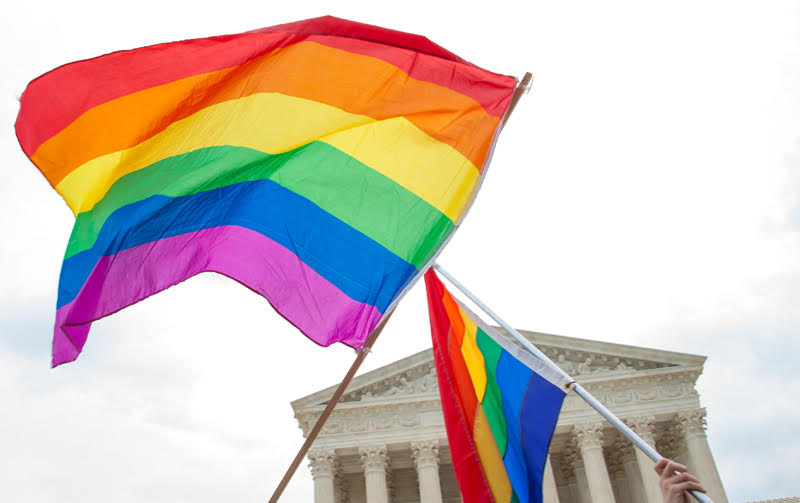Sex was the topic of conversation at the Supreme Court this fall when the Court was asked to decide whether federal employment protections afforded “on the basis of sex” apply to LGBTQ employees. On October 8, 2019, the nine justices heard oral argument in Altitude Express v. Zarda—along with the similar case Bostock v. Clayton County—which ask whether Title VII of the Civil Rights Act prohibits employment discrimination because of sexual orientation.
The controversy over the scope of Title VII’s protections in this area is relatively new. For fifty years, federal appellate courts and the Equal Employment Opportunity Commission (EEOC)—the federal body tasked with interpreting Title VII in administrative disputes—agreed that Title VII did not prohibit sexual orientation discrimination. Then in 2015 the EEOC reversed its position, which was followed in 2017 by the Seventh Circuit, and in 2018 by the Second Circuit in Zarda. Last year in Bostock, however,the Eleventh Circuit disagreed, holding that it was bound by circuit precedent that sexual orientation discrimination was not actionable under Title VII, priming the question for the Supreme Court.
In Altitude Express, Zarda alleged that he was fired from his job as a skydiving instructor because he was gay. Zarda often taught skydiving in tandem—which requires customer and instructor to be strapped shoulder-to-shoulder and hip-to-hip. To diffuse the awkwardness, Zarda would often tell female customers that he was gay. In June 2010, however, a customer complained to Altitude Express that Zarda had touched her inappropriately and used his sexual orientation as a cover. Altitude Express fired him. One month later, Zarda filed a charge of discrimination with the EEOC.
Title VII expressly protects employees against discrimination because of “race, color, religion, sex, or national origin.” In Altitude Express,the Second Circuit held that employment discrimination against gay employees is a subset of sex discrimination, actionable under Title VII because it is necessarily motivated at least in part by sex. The court also noted that Title VII bars employment decisions predicated on “assumptions about how persons of a certain sex can or should be.”
The Second Circuit’s reasoning may well not win the necessary five votes on the Supreme Court. Arguments rooted in philosophical traditions favored by conservative members of the court—namely textualism and originalism—contend otherwise. First, the argument goes, Title VII bans sex discrimination, and “sex” and “sexual orientation” are not synonymous. Homophobia does not target men because they are men or women because they are women—it targets both men and women who are gay. Discrimination against gay employees suggests animus towards a particular sexual orientation, not against a particular sex. A second argument asserts that Title VII was intended to remedy employment discrimination against women, not to stop employment discrimination based on sexual orientation. (A more fulsome examination of the statutory interpretation arguments on each side is available here.)
A ruling that Title VII does not bar sexual orientation discrimination could increase discrimination in the workplace and intensify other risk factors for millions of LGBTQ individuals across the country, as Loren AliKhan notes on SCOTUSblog. In terms of raw numbers, she explains, “it’s like asking whether the population of the state of Ohio is protected by the federal employment discrimination laws.”
Even with such a ruling, legal protections for some LGBTQ employees would remain in place. It would not unsettle the laws of 21 States and the District of Columbia, which ban sexual orientation discrimination (although, as AliKhan points out, many states rely on the EEOC’s authority to investigate companies charged with discriminatory practices). It would also still permit LGBTQ employees to bring Title VII actions based on gender stereotyping under a line of cases that follow the Supreme Court’s 1989 decision in Price Waterhouse v. Hopkins.
In Price Waterhouse, a senior manager was passed over for partnership despite outstanding performance reviews because, in the colorful words of the firm’s partners, she was “macho,” and she needed to take “a course at charm school” and “walk more femininely, wear make-up, have her hair styled, and wear jewelry.” In finding that Price Waterhouse had violated Title VII, the Supreme Court explained that stereotyped remarks could be evidence that “gender played a motivating part” in an employer’s decisions, in violation of Title VII. The employee’s sexual orientation is not a factor in this analysis.
Ideas about heteronormative mannerisms or clothing styles are “sex stereotypes” because they are based on societal constructs of masculinity and femininity. The motivating factor behind the decision to fire a “macho” female employee is not the employee’s sexual orientation, but whether she presents as sufficiently “feminine” to colleagues, clients and customers. Under Price Waterhouse and Title VII, the employer cannot fire her on the basis of such gender stereotypes⎯whether she is straight or not.
Deciding Altitude Express under the Price Waterhouse sex stereotype framework, however, would require the Court to determine whether heterosexuality itself is a “sex stereotype” under the law. It’s more likely that the Court will sidestep this question and rule instead on the narrow issue of whether the word “sex” includes sexual orientation in the context of employment discrimination.
But even a narrow ruling would have broad implications for LGBTQ rights in the workplace. If Altitude Express is reversed, LGBTQ individuals in more than half of the states in the country could be fired for their sexual orientation without any consideration for job performance. The reach of the decision extends even farther if we consider how discrimination—especially if unchecked by law—plays out in less formal dynamics of workplace culture and our extended communities. Although not a question for the courts, it will be an important conversation for employers and other allies who remain committed to fostering inclusive and respectful workplaces where everyone is treated with respect, no matter how “sex” is defined.
Emily Rebecca Hush is an associate in Debevoise’s New York office.
Comments? Suggestions? We’d love to hear from you. Send us an email at women@debevoise.com.

